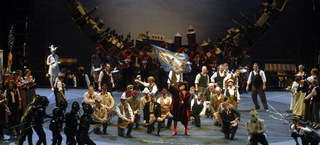|
Back
Not Exactly a Meisterlied, But Close Berlin
Deutsche Oper
02/05/2010 - & February 14, 21, 2010
Richard Wagner: Die Meistersinger von Nürnberg
James Johnson (Hans Sachs), Frank van Hove (Veit Pogner), Thomas Blondelle (Kunz Vogelgesang), Simon Pauly (Konrad Nachtigall), Markus Brück (Sixtus Beckmesser), Stephen Bronk (Fritz Kothner), Jörg Schörner (Balthasar Zorn), Peter Maus (Ulrich Eisslinger), Burkhard Ulrich (Augustin Moser), Klaus Lang (Hermann Ortel), Jörn Schümann (Hans Schwarz), Hyung-Wook Lee (Hans Foltz), Klaus Florian Vogt (Walther von Stolzing), Paul Kaufmann (David), Michaela Kaune (Eva), Ulrike Helzel (Magdalena), Krzysztof Szumanski (Night Watchman)
Orchestra, Chorus, and Extra Chorus of the Deutsche Oper Berlin, Donald Runnicles (conductor)
Peter Sykora (sets), Kirsten Dephoff and Peter Sykora (costumes), Götz Friedrich (production)

(Courtesy of Deutsche Oper, Berlin)
Three performances of the only comedy among Wagner’s mature works have been slated for the last of the Deutsche Oper’s “Wagner Festival Weeks,” all featuring the house’s incoming music director, Donald Runnicles, at the head of the orchestra. Götz Friedrich’s 1993 production is surprisingly traditional for such an overtly political artist, and it is not wholly free of workups on class conflict. But it does give us a traditionally minded Nuremberg of approximately Wagner’s own time. Peter Sykora’s sets represent the city in the first and third acts with semicircular models, suggesting that to Nuremberg’s residents their town is simply the whole world. Act II’s more abstract houses do the job more or less well. No one was ever shocked, scandalized, or even really moved by this production, but it is at least serviceable.
Fortunately this staid Nuremberg was invaded by the soaring lyric tenor of Klaus Florian Vogt, a splendidly clarion voice for lighter Wagner hero parts. He was an effective partner for Michaela Kaune, a soprano of great physical beauty who sang Eva with sonorous charm and an ease of gesture that captured the innocence and youthful ardor we expect. James Johnson is, to put it politely, past his prime, but hints of a charming legato still resonated as he worked through the exhausting role of Hans Sachs. He got off to an inauspicious start, with a noticeable warble in the first act. The second act and, still more, the third act, however, witnessed a sound that he could only have paced for the fuller evening. His final scene declamations, at least, evoked strong memories of great Wagner baritones. Markus Brück was a comically tedious Beckmesser, adding impressive acting to his part’s pinched vocal demands. Paul Kaufmann’s David and Ulrike Helzel’s Magdalena almost made me forget how unnecessary the roles really are to the opera. Krzysztof Szumanski made a firm impression as the Night Watchman.
The greatest disappointment came from Runnicles’s conducting, which was loudly booed at the final curtain. I understood his efforts, never regarded as among the world’s greatest even in the best of performances, as the result of scarce rehearsal time. At several points in the evening the performance sounded disjointed, with stage action and vocalism out of step with what was happening in the pit. The overture was sluggish and undisciplined. Hans Sachs’s monologues seemed oddly out of step with the orchestral playing. The finale, one of opera’s most impressive, passed unmovingly. Together with Johnson’s troubled Hans Sachs, one recalled how difficult a feat it can be to organize and execute a solid performance of the opera. Runnicles is scheduled to conduct the full Ring later this spring. His Meistersinger does not augur well.
Paul du Quenoy
|